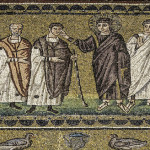We run our website the way we wished the whole internet worked: we provide high quality original content with no ads. We are funded solely by your direct support. Please consider supporting this project.

Paul Teaches Free Will, Not Determinism: Romans 9, Part 3
In this series of posts, I am challenging the deterministic reading of Romans 9, which interprets Paul’s teaching as saying that God chooses some to be saved and others to be damned. There are six arguments that I offer to challenge this popular view. Today, I will look at the fourth.
Argument #4: Paul’s Summary and Free Will
A fourth argument that demonstrates the error of the deterministic interpretation of Romans 9 concerns Paul’s summary at the end of this chapter. Whenever we are struggling to understand a complex line of reasoning such as we find in Romans 9, it is crucial to pay close attention to the author’s own summary of his argument, if and when he provides one. By all accounts, Romans 9 is a difficult, complex and highly disputed passage. Fortunately, Paul provides us with a very clear summary of his argument in this chapter (vss. 30-32). Unfortunately for the deterministic interpretation, it appeals to free will as the decisive factor in determining who “receives mercy” and who gets “hardened.”
Paul begins his summary by asking, “What then shall we say?” (vs. 30). If the deterministic interpretation was correct, we would expect Paul to answer by saying something like, “The sovereign God has determined who will be elect and who will not, and no one has the right to question him.” As a matter of fact, however, Paul doesn’t say anything like this. He rather summarizes his argument by saying:
Gentiles, who did not strive for righteousness, have attained it, that is, righteousness through faith; but Israel, who did strive for the righteousness that is based on the law, did not succeed in fulfilling that law. Why not? Because they did not strive for it on the basis of faith, but as if it were based on works” (vss. 30–32).
This is extremely significant. Paul explains everything he’s been talking about throughout Romans 9 by appealing to the morally responsible choices of the Israelites and Gentiles. The one thing God has always looked for in people is faith. The Jews did not “strive” by faith, though they should have (cf. 10:3). They rather chose to trust in their own works. The Gentiles, however, simply believed that God would justify them by faith. This theme recurs throughout chapters 9 through 11. As a nation, Paul says, the Jews “were broken off because of their unbelief…” (11:20, emphasis added). This is why they have been hardened (Rom. 11:7, 25) while the Gentiles, who sought God by faith, have been “grafted in” (11:23).
We see that God’s process of hardening some and having mercy on others is not arbitrary: God expresses “severity toward those who have fallen [the nation of Israel] but kindness toward you [believers] provided you continue in his kindness” (11:22). God has mercy on people and hardens people in response to their belief or unbelief. And he is willing to change his mind about both the hardening and the mercy, if people change. If Gentiles become arrogant and cease walking by faith alone, they will once again be “cut off.” And if the Jews who are now hardened will not “persist in their unbelief,” God will “graft them in again” (Rom. 11:22-23).
To the Jews who trusted in their national identity and/or external obedience to the law, this hardening seemed arbitrary. Hence Paul chides them by asking, “[W]ho indeed are you, a human being, to argue with God? Will what is molded say to the one who molds it, ‘Why have you made me like this?’” (Rom. 9:20). But, as Paul makes abundantly clear throughout Romans 9-11, the hardening was in fact not arbitrary. It was perfectly consistent with the criteria of faith God has always worked with. He gives mercy in response to faith and he hardens in response to unbelief. It’s not the other way around. People don’t have faith as a result of God having mercy on them, and people don’t have unbelief as a result of God hardening them.
Yet, to Jews who remained convinced that their national identity and/or good works were the basis of God giving mercy, it now seemed like God was arbitrarily hardening them and arbitrarily extending mercy to the Gentiles.
Image by markchadwickart via Flickr.
Category: General
Tags: Belief, Determinism, Faith, Free Will, Mercy
Topics: Providence, Predestination and Free Will
Verse: Romans 9
Related Reading

Does God Still Heal?
In the ancient world Jesus was known first and foremost as an exorcist and a healer. These two activities are mentioned in every summary of Jesus’s ministry found in the Gospels. It’s common for Western Christians today to accept that infirmities (sickness, disease, injuries, disabilities and deformities) are part of God’s mysterious plan for their…

Why You Have Free Will
God’s decision to create a cosmos that was capable of love and that was, therefore, populated with free agents (see previous post) was also a decision to create and govern a world he could not unilaterally control. These are two aspects of the same decision. What it means for God to give agents some degree…

Podcast: If Our Names Have Been in the Book of Life Since Before Creation, Are We Still Free?
Greg considers the documentation habits of the Lord. http://traffic.libsyn.com/askgregboyd/Episode_0382.mp3

Open2013 Reflections
Both participants and leaders share about what was happening at Open2013 and some of their thoughts on Open Theism. Listen in and hear from Greg Boyd, John Sanders, Tom Oord, T. C. Moore, Jessica Kelley and many more.

Is God All-Powerful?
I want to answer yes and no. God is all-powerful in the sense that God originally possessed all power. Before Creation, God was the only being who existed, and thus had all the power there was. He could do anything, and nothing opposed Him. But with the creation of free creatures, I maintain, God necessarily…

Podcast: What’s the Difference Between MERCY and GRACE?
Is Mercy simply another word for Grace? Find out in this short taught thriller of an episode! http://traffic.libsyn.com/askgregboyd/Episode_0161.mp3
